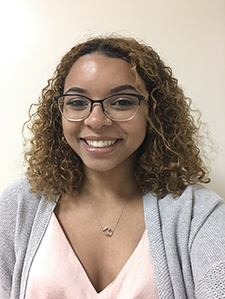 Meet Megan Hineline, a Junior majoring in Psychology with a Computer Science minor. She’s currently in two Psychology and Neuroscience faculty member’s laboratories – including Dr. Mitch Prinstein’s Peer Relations Lab and Dr. Deborah Jones’ Jones Lab. The Peer Relations Lab is involved in the study of peer relationships and adjustment across development and in understanding how peer relationships might contribute to psychological distress. The Jones Lab studies novel strategies for engaging at-risk and underserved families in evidence-based intervention, as well as understanding the underlying mechanisms that predict treatment process and outcome.
Meet Megan Hineline, a Junior majoring in Psychology with a Computer Science minor. She’s currently in two Psychology and Neuroscience faculty member’s laboratories – including Dr. Mitch Prinstein’s Peer Relations Lab and Dr. Deborah Jones’ Jones Lab. The Peer Relations Lab is involved in the study of peer relationships and adjustment across development and in understanding how peer relationships might contribute to psychological distress. The Jones Lab studies novel strategies for engaging at-risk and underserved families in evidence-based intervention, as well as understanding the underlying mechanisms that predict treatment process and outcome.
Tell us about your research. In the Peer Relations Lab, I help clean and collect data related to adolescents’ responses to stress in order to locate predictors of suicide risk. In addition to physiological responses, the lab analyzes interpersonal relationships. Specifically, we are currently starting a project that looks at students’ use of social media, which I find really interesting. In the Jones Lab, I was originally a part of a coding team for a year where I watched clinical sessions and learned to identify if parents were using “skills” (mostly positive reinforcement) effectively in order to better manage their child’s behavioral issues. This opportunity turned into a paid position where I now watch those children, and or their siblings, during sessions. This has created a more immersive research experience.
What has been the most difficult part of your research experience? I’m a first-generation college student, so getting involved in research was really intimidating. The most difficult part of the research experience for me is finding the right lab. A little research beforehand goes a long way. I now know that the Department of Psychology and Neuroscience hosts research fairs each semester that are a good starting point or that you can read about what each lab does on the department’s website. However, if you’re like me, you don’t know what kind of research you’ll like or if you will at all.
What is the most valuable lesson you’ve learned from this experience? My research experience has taught me to lean into discomfort if you really want to make the most of something. Experience is the best way to learn. The first lab I applied to rejected me, but gave advice on how to better answer questions the next time I applied to a lab. Then I was in the Jones lab as a part of a six undergraduate student team, working with mostly all graduate students. This intimidating setup was actually the perfect networking opportunity to ask questions not just about their research, but the research process and college as a whole. I wouldn’t have had half the networking or research opportunities if I didn’t take the leap when things were new.
What do you like most about your work? Being a Computer Science minor, I really enjoy learning about human-computer interaction. I did my PSYC 395 in the Peer Relations Lab over the fall semester and I wrote a literature review on computer-mediated communication’s effect on the development of adolescents’ interpersonal skills. This fit in well with the conversations we had in the lab while designing Dr. Prinstein’s latest research project. That was another immersive part of the research process, being able to contribute ideas to a bigger, reputable research project.
Our Undergraduate Research Series features spotlights on our Psychology and Neuroscience majors and minors who are conducting undergraduate research with our faculty! We believe strongly that undergraduate experiences are greatly enriched by inquiry and discovery through undergraduate research. Research experiences allow students to better understand literature, determine areas of interest, discover their passion for research, continue on to graduate studies, and to jump start their careers as researchers. If you are an undergraduate who is interested in pursuing research experiences, we offer PSYC and NSCI 395 as an opportunity to work side-by-side with graduate students and faculty members on cutting-edge psychological and neuroscience research. We also recommend you visit the Office for Undergraduate Research to find research opportunities, apply for research funding, and for helpful tools and advice. Research opportunities abound at UNC – find one that works for you!

